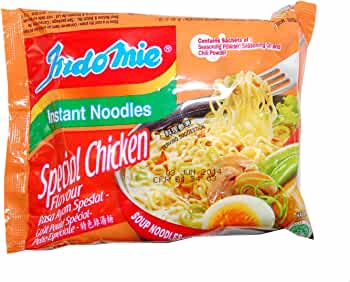Indomie, one of the world’s largest makers of instant noodles, is in hot water following the recall of its “special chicken” flavor noodles in Malaysia and Taiwan. The decision has raised concerns about the safety of the product globally, including, which is one of the largest consumers of Indomie instant noodles.
The health institutions in Malaysia and Taiwan detected ethylene oxide, a substance known to cause cancer, in the product. As a result, the National Agency for Food and Drug Administration and Control (NAFDAC) has set in motion plans to conduct fresh independent tests on the concerned products.
The Taipei City Health Bureau in Taiwan detected ethylene oxide in two types of instant noodles, including the Indomie chicken flavor, following random inspections. The department said in a statement that the detection of ethylene oxide in the product did not comply with standards.
“The Taipei City Health Bureau reminds the food industry that our country has not approved the use of ethylene oxide as a pesticide, nor has it approved the use of ethylene oxide gas as a disinfection purpose,” the department said.
The health ministry in Malaysia has examined 36 samples of instant noodles from different brands since 2022 and found that 11 samples contained ethylene oxide. The ministry has taken enforcement actions and recalled the affected products.
Indo-foods, the Indonesian company and maker of Indomie instant noodles, has denied the allegations, noting that all its noodles are produced with standard certification. Nevertheless, Taiwan and Malaysia have ordered businesses to immediately remove the products from their shelves.
In response to the allegations, Taufik Wiraatmadja, a member of the board of directors at Indofoods, defended the safety of the noodles, noting that they are safe for consumption. “All instant noodles produced by ICBP in Indonesia are processed in compliance with the food safety standards from the Codex Standard for Instant Noodles and standards set by the Indonesian National Agency for Drug and Food Control (“BPOM RI”). Our instant noodles have received Indonesian National Standard Certification (SNI), and are produced in certified production facilities based on international standards,” he said.
Pottage Of Health spoke with Peace Ighodaro an Event planner and coordinator who expressed concern over the recent recall of the product in Malaysia and Taiwan, “I consume Indomie noodles at least twice a week, but after hearing about the recall in Malaysia and Taiwan, I am concerned about the safety of the product,” said Ighodaro. “I want the regulators to do their best in ensuring that the products sold are safe for consumption. For now, I won’t be consuming the product until the issue is resolved,” she concluded.
NAFDAC Director General, Mojisola Adeyeye, has confirmed the agency’s plans to conduct independent tests on the concerned products. “NAFDAC is responding. We plan to randomly sample Indomie noodles (including the seasoning) from the production facilities while PMS samples from the markets. This we will carry out on Tuesday 2nd May (as Monday May 1st is a public holiday). The compound of interest is ethylene oxide, so the Director (Lab Services) Food has (is) being engaged, and he is working on the methodology for the analysis,” she said.
Nigeria, which is one of the largest consumers of instant noodles globally, is expected to take a position on the matter in the coming days. According to data from the World Instant Noodles Association (WINA), Nigeria, Africa’s most populous nation, is currently among the largest consumers of instant noodles with 1.92 million servings as of May 2020. The country also ranked 11th in the global demand for noodles ranking, with Indomie instant noodles being the most consumed brand.
The recall of Indomie instant noodles in Malaysia and Taiwan has raised concerns about the safety of food globally. Ethylene oxide is a chemical known to cause cancer and has been detected in the product by health authorities in the two countries. The National Agency for Food and Drug Administration and Control (NAFDAC) has set in motion plans to conduct fresh independent tests on the concerned products to ascertain the claims. Nigeria is expected to take a position on the matter in the coming days.




Nice